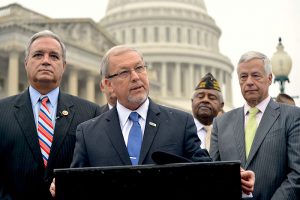
The Honorable Johnny Isakson, Chairman
Senate Veterans’ Affairs Committee
412 Russell Senate Office Building
Washington, D.C. 20510-6375
The Honorable Jon Tester, Ranking Member
Senate Veterans’ Affairs Committee
825A Hart Senate Office Building
Washington, D.C. 20510-6375
The Honorable Phil Roe, Chairman
House Veterans’ Affairs Committee
335 Cannon House Office Building
Washington, D.C. 20515
The Honorable Tim Walz, Ranking Member
House Veterans’ Affairs Committee
333 Cannon House Office Building
Washington, D.C. 20515
Chairmen Isakson and Roe and Ranking Members Tester and Walz:
I write today to express the profound concerns of DAV (Disabled American Veterans) for the provision in the Administration’s budget request that would adversely impact many of our nation’s service-disabled injured or ill veterans and their families. This proposal would restrict a total disability rating for Individual Unemployability (IU) provided by the Department of Veterans Affairs (VA) to veterans for who are unable to maintain gainful employment.
This benefit allows VA to pay certain veterans disability compensation at the 100 percent rate, even though VA has not rated their service-connected disabilities at the total level. Specifically, the proposal would terminate existing IU ratings for veterans when they reach the minimum retirement age for Social Security purposes (62), or upon enactment of the proposal if the veteran is already in receipt of Social Security retirement benefits. DAV finds this proposal particularly objectionable and vehemently opposes its enactment.
As you know, Congress delegated to the VA Secretary the authority to adopt and apply a schedule of rating disabilities pursuant to section 1155 of title 38, United States Code. In accordance with VA regulation promulgated by the Secretary, total disability exists when any veteran is determined by VA to be unable to secure and maintain substantially gainful employment due solely to service-connected disability, regardless of age. (See 38 C.F.R., section 4.16(b).) IU is based on the impact of the individual’s own circumstances and it is an exception to the “average person standard” of the rating schedule. As a prerequisite for an IU rating, a veteran generally must have a disability rated 60 percent or higher under the rating schedule.
We want to emphasize that total compensation for IU is not a retirement benefit. Properly applied, the rules require a factual showing that the service-connected disability is such as to be incompatible with substantially gainful employment, regardless of age. Although age is not a factor in consideration of this benefit, today, many people, including the President, members of the Cabinet and members of Congress, work well beyond the minimum or “normal” retirement age. Some continue to work because they love their job, while others may be forced by financial requirements to continue to work.
This proposal will generate, at the expense of severely disabled veterans and their families, savings to the mandatory Compensation and Pensions account at an estimated $3.2 billion in fiscal year 2018, $17.9 billion over five years, and $40.8 billion over ten years. Severely disabled veterans need this special benefit to maintain a restrained standard of living. Unfortunately, the loss of income to these men and women and their families goes even deeper. The elimination of IU benefits would affect not only the veteran’s family income, but other critical ancillary benefits, such as dental coverage, eligibility to Survivors’ and Dependents’ Educational Assistance, the Civilian Health and Medical Program of the VA (CHAMPVA) and commissary and exchange privileges. Additionally, we point out that the overall value of Social Security benefits under this proposal are reduced since veterans would be forced to take the benefit at the earliest date (age 62), when the benefit is nominal. Additionally, the loss of total disability will unfavorably impact access to certain state benefits such as property tax exemptions for veteran homeowners, free vehicle registration and other similar benefits.
Less than one half of one percent of our county’s citizens currently serve in uniform in the military and less than 10 percent of the population have served in the military since the beginning of World War II. Many military members and their families make tremendous sacrifices, some die and others suffer catastrophic injuries or illness due to their service that adversely impact the remainder of their lives. A variety of benefits are provided by a grateful nation to those who honorably serve. Special compensation, benefits and health care services are provided to war veterans, especially those wounded, injured or made ill due to their military service. These benefits are provided to veterans in addition to all other benefits provided by our government to its citizens, such as Social Security, Social Security Disability Insurance and Medicare. As American citizens, we contribute part of our wages for eligibility to these programs. In essence, VA’s primary goal to restore the capability of veterans with disabilities to the greatest extent possible and to improve the quality of their lives and that of their families through a variety of special benefits is seriously negated by this ill-advised IU proposal. For these numerous reasons, DAV strongly objects to the Administration’s proposal to eliminate a VA benefit intended to ensure those who are disabled as a result of their service to our nation and cannot secure or maintain substantially gainful employment are not further disadvantaged because of their honorable service.
DAV members have felt so strongly about attempts to eliminate earned benefits from ill and injured veterans that the delegates to our most recent convention have continued a long-standing policy to mandate our oppositions to such proposals and passed a number of resolutions to address these circumstances, such as DAV Resolution No. 008, which opposes reduction, taxation or elimination of veterans benefits; DAV Resolution No. 015, which opposes any proposal that would reduce payments of VA disability compensation by payments of Social Security Disability Insurance or any other federal benefit paid to a veteran; and DAV Resolution No. 019, which opposes any recommendations by any commission or other source to reduce or eliminate benefits for disabled veterans. These resolutions are attached so you can see how strongly DAV members feel about the potential loss of any earned benefits.
On behalf of the men and women injured or made ill due to military service, I call upon you to send a strong message to the Administration and to our disabled veterans and their families that you will not tolerate such thoughtless proposals to take away earned benefits from disabled veterans.
Sincerely, GARRY J. AUGUSTINE
GARRY J. AUGUSTINE
Executive Director
Washington Headquarters
GJA:lmb
Attachments




